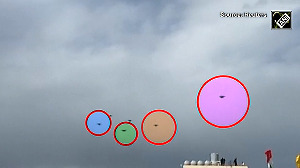Cementing the peace process in Nepal, the government and Maoists on Tuesday signed a pact mandating the United Nations to manage rebels' arms and troops as per the agreement reached between them last week to end the decade-long insurgency in the Himalayan nation.
Home Minister Krishna Prasad Sitoula and Maoist spokesman Krishna Bahadur Mahara signed the 'Agreement on Monitoring of the Management of Arms and Armies' in the presence of UN officials.
Jan Eric Wilhelmson, military advisor to the UN head of mission in Nepal, and Ian Martin, UN secretary general's representative, witnessed the signing of the pact. A copy of the pact was handed over to the UN officials.
"We have signed a 12-page agreement on disarmament. There are many issues covered in the agreement, including verification of the Maoist army and weapons, and the role we would like the United Nations to take in monitoring," Pradeep Gyawali, a government negotiator, told reporters.
"We have agreed to manage the arms and armies after six days of continued discussions and it was a very tough task," Sitoula told journalists after signing the document.
"This is the most important part of the historic peace agreement. Now it will ensure free, fair and fearless Constituent Assembly elections," he said.
Maoist negotiator Mahara said, "This has opened the door for the peace process to move forward. Now we will move towards holding the Constituent Assembly elections to rewrite the Constitution."
"We have shown our strong commitment and sincerity to end the armed conflict," Mahara said adding, "we are aware of the challenges that lie ahead."
The agreement divided in seven chapters mentions the modalities and rules of managing arms and armies of both sides under UN monitoring.
Under the pact, the Maoists will be stationed in cantonments while the Nepalese Army will be confined to their barracks to facilitate free and fair elections to the Constituent Assembly for re-writing the constitution.
Under the agreement, both parties have decided not to include children under 18 years in the cantonment or barracks and Maoist soldiers recruited after May 25 will not be treated as their combatants.
Both sides will have to provide information about landmines, unexploded mines and minefields to each other under the pact.
Each main cantonment site (of Maoists) will be allowed 30 armed personnel with weapons for security of the sites and 15 such armed personnel will be allowed in satellites or sub-divisions.
There will be seven main cantonment sites and 21 satellite sites for the settlement of the Maoist army. Under the agreement, any air movement of the Nepalese Army will have to be notified at least 48 hours in advance.
The Maoists were due to join a new interim government on Sunday, but that was delayed amid detailed talks on how the Maoists should lock up their guns. The government also wanted Maoist soldiers in camps before they were granted 73 seats in a new 33-seat Parliament.






 © 2025
© 2025